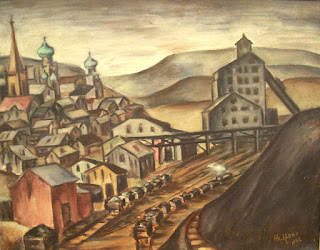The exhibition Coal & Steel, Sources & Uses, is on view at the
Susan Teller Gallery from July 17 through August 29, 2012. Showing are fifty
paintings and works on paper by more than twenty American artists including Will Barnet, James Daugherty, Hugo
Gellert, James Penney, Angelo Pinto, and Ben Shahn.
 |
| Ben Shahn, Head of Welder |
Coal mining and steel production, foundations of American industry, were
strong sources of inspiration for artists of the 1930s, 40s, and 50s. During
The Depression these male-dominated fields were fraught conflicting
issues. Were they dangerous, un-caring
institutions that abused workers who were desperate for any employment, or were
they sources of a living wage and the dignity of a day’s labor?
A great deal of the material here can be traced back to Harry Sternberg and
his class at the Art Students League. Sternberg was awarded Guggenheim Grant study American industry in 1936. His
monumental painting, Steel, 1937-38, is in the exhibition.
 |
| Riva Helfond, Panther Creek Valley, 1932 |
Riva Helfond, whose future husband Bill Barrett, was from Lansford, Pennsylvania, was Sternberg’s conduit to actual mines and mining communities, largely in the north-eastern, anthracite region. Sternberg made regular weekend trips taking members of his class: Blanche, Grambs, Helfond, Axel Horn, and Charles Keller. (Winifred Lubell went once, but there had been an accident a day or so before and so they returned home without doing any art work.) Keller also had connections to mines in North Carolina, Alex Horn to mines in West Virginia.
 |
| Michael J. Gallagher, Coal Breaker, about 1940 |
Philadelphia's Michael J. Gallagher, himself from a mining family, lead the Work Progress Administration (WPA) Printmaking Shop. Hugh Mesibov was with him there in the later 1930s and in the 1940s Mesibov worked at Cramps Shipyard which was re-opened to make ships for the war effort and at it’s height employed 18,000 laborers.
While coal fed the furnaces of factories and homes, steel was used to build the factories themselves, the infrastructure of railroads, bridges, canals and skyscrapers. As the country entered World War II, steel was used to build the great ships and the machines of war, and then to re-build the American Dream as with Mitchell Siporin’s Railroaders, Lynd Ward’s Pipelines, and Fred Shane’s Clam Shell Dredge.
 |
| Hugh Mesibov, Mural Study for Steel |
